You’ve had many incredible years with your Dachshund by your side. You still picture him or her as a puppy, romping around and chewing up shoes. The memories you’ve created are unforgettable.
But now your dog has slowed down. They’re no longer enjoying their favorite toy and often bark in the middle of the night at seemingly nothing.
It’s an unfortunate realization, but your senior dog could be experiencing canine cognitive dysfunction (CCD) syndrome, otherwise known as canine dementia or doggy dementia.
Canine dementia is similar to a human with Alzheimer’s.
Unfortunately as pet parents there is nothing we can do to avoid CCD, as it’s caused by abnormal processes of the brain.
Which Dogs Experience Canine Dementia?
CCD doesn’t discriminate.
While there are some studies out there that have attempted to determine the risk factors, many are contradictory. Scientists haven’t been able to pinpoint exactly what causes it.
Generally, most dogs can end up with some form of cognitive impairment, regardless of size, breed, or sex.
It doesn’t happen to all dogs but, the older the dog is, the more likely they are to be experiencing symptoms.
At What Age Can Dogs Start Showing Signs of Canine Cognitive Dysfunction?
Studies show that approximately 60% of dogs over 15 years of age experience CCD.
In the study Risk factors for canine cognitive dysfunction syndrome in Slovakia, it was “observed [that there was a] greater prevalence of canine cognitive dysfunction syndrome (CCDS) in medium/large sized breeds compared with small sized breeds in the age group of 11–13 years, while [there was] no difference was observed in the age group of 8–11 years.”
In other words, any dog can start to experience signs of dog dementia around the age of 8.
When I Realized My Dachshund Had Dementia
I never really thought about my dog getting dementia.
My Dachshund started getting grumpy as he got older. It turns out this may not be normal.
My Dachshund started getting grumpy as he got older.
He didn’t seem in pain, or to have anything like arthritis, so I just figured it was just grumpy old man syndrome. It didn’t seem abnormal.
Then, when he was around 13, he started to pee in the house.
Dachshunds are known for being difficult to potty train, and I don’t consider that he was 98% potty trained until he was about 7 years old, so I figured he was just backtracking on this training.
Plus, Dachshunds can be stubborn and dislike going out in the rain or cold weather.
I don’t remember what time of year it was when he started to have accidents in the house but I do remember that I chalked it up to him just not “feeling like” he wanted to go outside.
When the usual potty training refresher wasn’t working, I took him to the vet to see if a medical condition might be causing it.
The vet suspected it was incontinence and sent us home with the most common medicine. He did say it didn’t work for all dogs and seemed to have no effect on my dog so I eventually stopped giving it to him.
I just decided to manage my dog peeing in the house and live with it.
Then, a few months later, I noticed that he was rapidly losing weight.
I took him to our regular vet and they ran a lot of tests.
The results indicated that he might have a problem with nutrient absorption so they referred us to an internal medicine specialist.
I spoke with the specialist about treatments for my Dachshund’s condition but also mentioned to her that he was peeing in the house all of the time now.
We talked a little more and she casually mentioned that the accidents in the house are most likely due to dementia – he’s just simply forgetting he is supposed to go outside (which is why the incontinence medication wasn’t helping).
Hearing other people’s stories can help you recognize if your Dachshund is exhibiting signs that indicate canine dementia.
I didn’t think much of it but I joined the Canine Cognitive Dysfunction (CCD) Support Group on Facebook to learn more about dog dementia.
Honestly, the stories people were sharing in the group seemed different (more extreme) than how my dog was acting but I could see some similarities. The more I learned, the more sure I was that he had mild dementia.
Eventually, he started to do some of the things I read about dogs with compromised reasoning doing. I finally admitted that he did indeed have canine dementia.
I went back to our vet and he was put on Selegeline to slow the progress of his mental decline. I also tried all of the recommended supplements for CCD, including CBD for dogs.
Over the next year, he got more grumpy and more confused.
He started waiting at the wrong side of the door to go out (the hinge part).
He would try to run the other way when I tried to shoo him through the door because he didn’t know what I was asking him to do.
He continued to have more accidents in the house and eventually had to wear diapers.
He started waking up at all times of the night, acting anxious and refusing to settle back down.
Eventually, everything I was giving him to help address the dementia stopped working. Not even the CBD would calm him at night anymore.
I asked the vet for a sedative. That didn’t have any effect on his anxiety and resistance to sleeping.
When he stopped recognizing our house, how to get inside, and started to forget who we were, we decided it was time to say goodbye.
It was the hardest thing I’ve ever been through with a pet.
What Does Canine Dementia Look Like?
Are you concerned that perhaps your beloved furry friend is suffering from CCD?
CCD can look different in each dog but there are some common signs.
Here are 5 signs of canine cognitive dysfunction (CCD)to look for:
Improper Elimination
Urinating or defecating in the house is a common sign that your dog is suffering from CCD.
If your dog was previously housetrained, medical causes have been ruled out, and your dog hasn’t experienced any huge life changes lately, the cause may be CCD.
Disorientation
Another obvious sign of CCD is your senior dog becoming disoriented in your home or normal environment (as long as you haven’t moved or significantly rearranged your home).
Perhaps at night your dog goes into a different room to stare at the wall inside of to his dog bed.
Or maybe they get stuck behind the couch, as they wandered back there and don’t know how to get out. Spatial awareness is affected.
Interactions with Other Animals and People
A dog with CCD may become cranky or standoffish around other household pets or humans.
Even the most social dogs can becoming irritable around others if they are battling CCD.
The key factor here is that it’s a behavior change – your dog isn’t their friendly self anymore.
Sleep Cycles
Sleep patterns are likely to be disrupted if your dog has CCD.
They could sleep all day and be up at night.
Your dog may even become more active at night, much like a reversal of a sleep-wake cycle.
A dog with CCD can also experience restlessness. Is your dog barking excessively or at times when nothing is happening? That can also be a sign of CCD.
Activity Level
Your dog may have once been extremely active, but the onset of CCD could have caused a major decline in activity level.
Your dog may not be responsive to toys or their food bowls, and they may not want to interact with other pets or you as much.
What Can You Do if Your Dog Has Dementia?
If you suspect your dog is suffering from canine dementia based on any of the above symptoms, you’ll want to seek veterinary attention. Your vet will help determine if your dog does indeed have CCD, or perhaps a different medical ailment.
If you think your Dachshund is showing signs of CCD, take him or her to your vet so other potential causes of the behavior change can be ruled out.
The veterinarian can test for other issues like arthritis, diabetes, cancer, kidney issues, or sight and hearing loss. Blood tests, X-rays, urinalysis, and other diagnostic tests can be administered to make the final determination.
Note: some of the links below are affiliate links, which means that we get a small comission on qualifying purchases.
Although CCD is not curable, you can potentially slow down the process. With the guidance of your veterinarian, you can consider a diet change.
Certain foods formulated to enrich your dog’s cognitive strength include ingredients such as anti-oxidants and omega-3 fatty acids.
Many dogs have success with foods like Purina Pro Plan Bright Mind.
There are also many supplements and medications known to help.
Supplements for Dog Dementia
– Senilife
– Cholodin
– Dr. Bill’s Canine Cognitive Support
– Sam-e
– Coconut Oil
– Melatonin (make sure there are no sugar or sugar substitute ingredients in it)
– Fish oil, specifically Omega-3
Medication for Canine Cognitive Dysfunction
These are medications you can talk to your veterinarian about. They can write you a prescription.
– Seligiline
– Trazadone
– Fluoxetine
– Gabapentin
– Xanex
Calming Aids
– CBD treats or Oil
– Zylkene
– VetriScience Composure
– Rescue Remedy
Keeping your dog’s brain active can help improve symptoms of canine dementia.
Another easy change you can make is introducing food and treat puzzles which encourage mental stimulation.
Any sort of toy where your dog needs to work to gain the treats or food will help keep them mentally active.
Two of my favorite interactive toys are snuffle mats and the Outward Hound Nina Ottosson Dog Tornado Treat Puzzle.
You can also take your dog to play dates or to the park to socialize with others dogs in order to keep them physically active. Just like for humans, physical and mental exercise are imperative.
A specially enhanced diet along with an enriching environment provides the greatest chance at not stopping the process of CCD, but slowing it down.
If you think your dog has dementia, please discuss it with your vet.
You can also join the Canine Cognitive Dysfunction (CCD) Support Group on Facebook and read the posts to see if it sounds like what is happening with your dog.
For more information regarding changes in behavior in senior dogs, and their changing needs, read these important things your senior dog wants you to know.
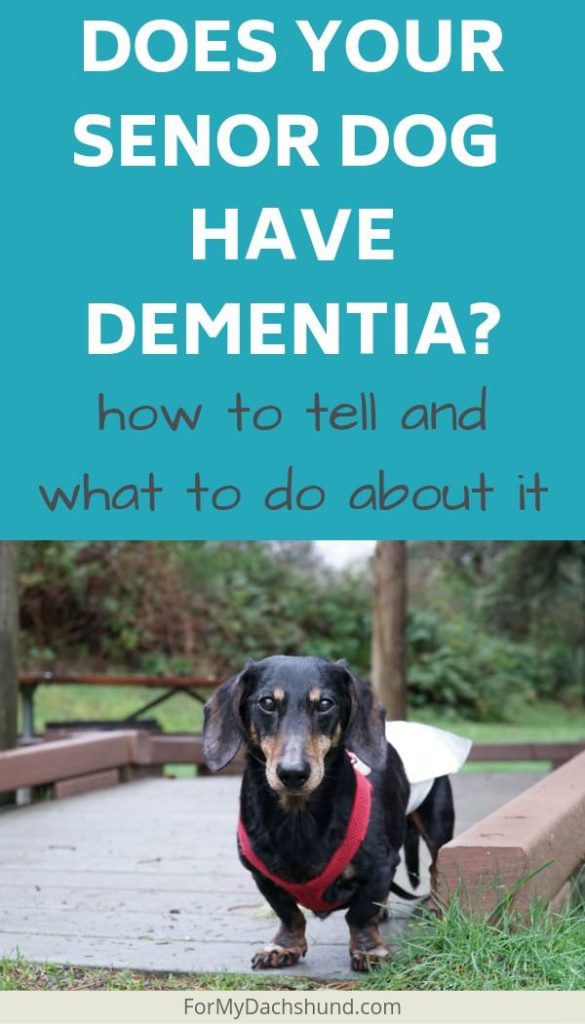
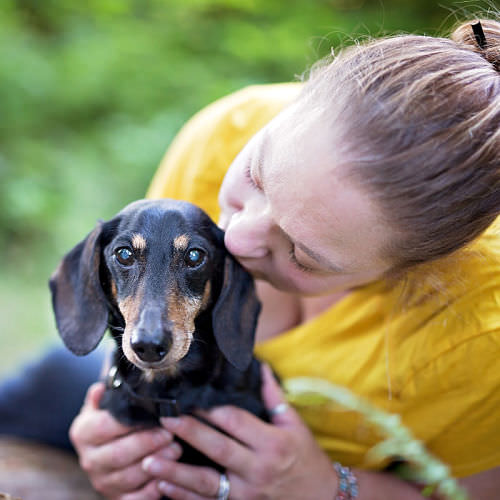
About the Author: Through her 17 years of owning and caring for Dachshunds, and almost 10 years researching and writing about them, JW has become a respected expert in the Dachshund community. Read more about her here.

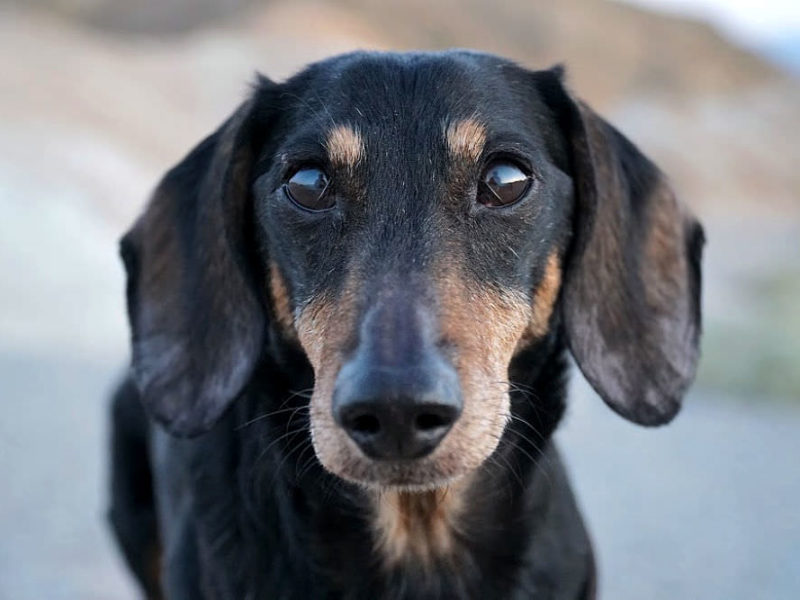
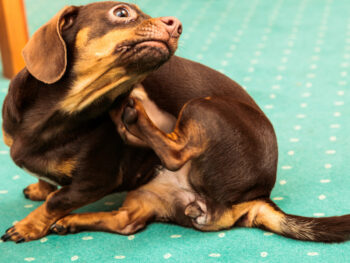
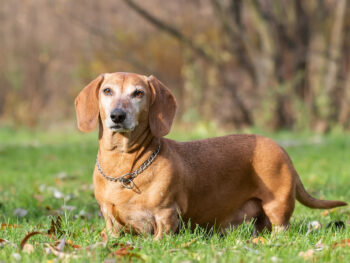



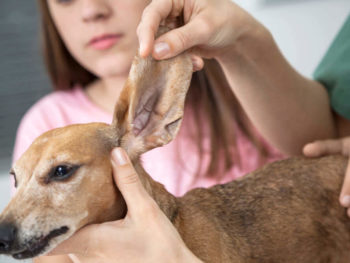


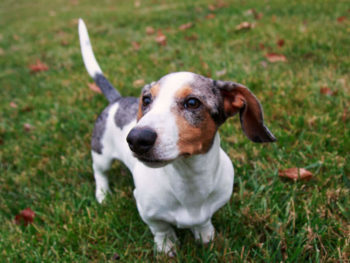
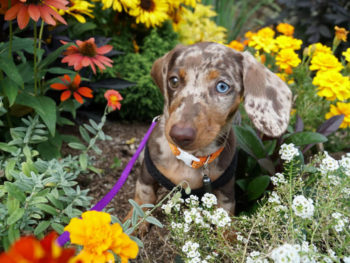
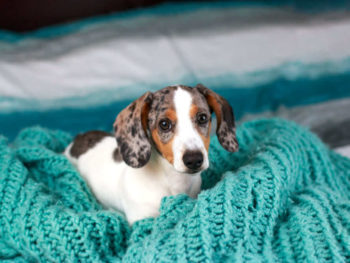
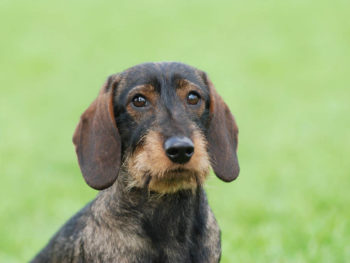
 Should I Adopt a Friend for My Dachshund?
Should I Adopt a Friend for My Dachshund?


